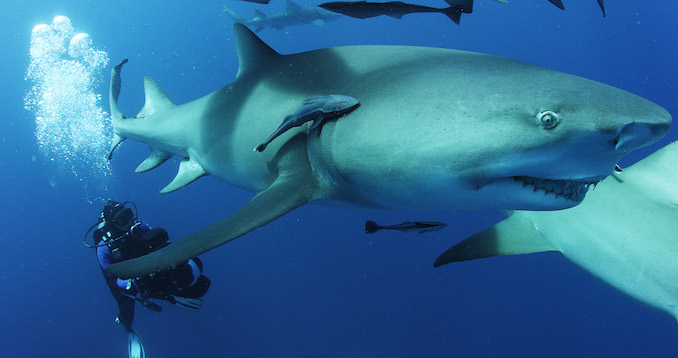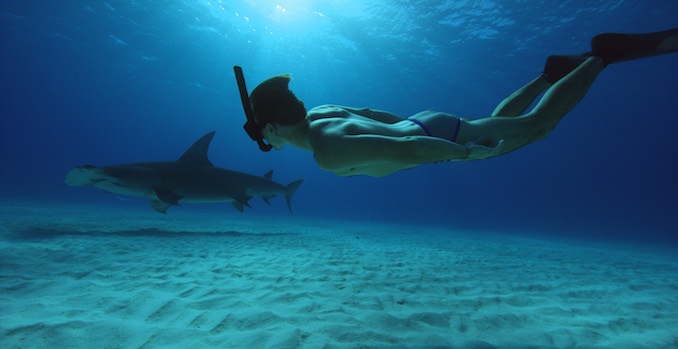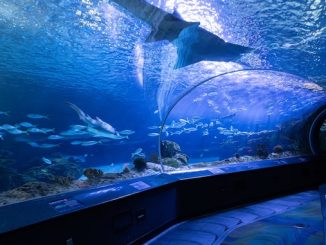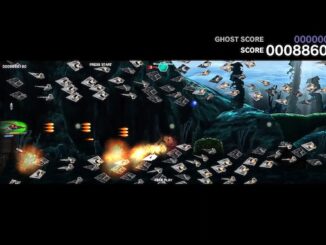Sharkwater, Rob Stewart’s first film, brought the devastating issue of shark finning used in shark fin soup to the world stage. His multi award-winning film changed laws and public policy worldwide, and created hundreds of conservation groups. Today more than 90 countries have banned shark finning or the trade of shark products. Even so, sharks are still being fished to extinction.
Sharkwater Extinction (now in theatres) continues the adventure across four continents, as Rob travels through the oceans with his team to investigate the corruption behind a multi-billion dollar industry. The crew goes through some of the world’s most dangerous fishing ports and dives into remote underwater locations to reveal the catastrophic effects humanity has had on the oceans.

Stewart dedicated his life to conservation, saying “Conservation is the preservation of human life. And, that, above all else is worth fighting for.” He taught the world to love the oceans and their creatures and not fear sharks through his iconic images of hugging and free diving with sharks and mantas. Tragically, Rob died in a dive accident in January 2017 while filming Sharkwater Extinction in the Florida Keys.
We had a chance to chat with Brock Cahill and Julie Anderson, friends and members of his filming team recently to learn more. Brock Cahill, Founder of SeaChange Agency, a non-profit ocean conservation organization. Julie Anderson is a California-based conservationist who runs three shark related non-profit organizations.
There’s still work to be done in raising awareness about the shark fishing industry. What was the primary mandate of making this second film?
Brock: When we recognized, that even through all the successes and awareness raised via Sharkwater, that even more sharks were being killed in present day than we were killing in that time period, we realized that our work was not done. Rob called up and said, hey you ready? The sharks need our help. Of course I was all in! We came to realize that some estimates for shark mortality had skyrocketed to 150 million sharks per year, up drastically from the 80-90 million circa Sharkwater in 2006. Just over half of these could be accounted for in the shark fin industry, for shark fin soup, but where were the others going?? That was the mystery we set out solve in this film. And so we dived in.
It raises awareness that this is still a lucrative market that’s gone deeper underground. Did that surprise you?
Brock: It did not surprise me that the black market for these products had burrowed underground even further, but what did surprise me was the lack of secrecy in which these underground markets operated. In plain sight! In the light of day! On the weekends! And just around the corner from the “watchful eye” of the authorities sworn to protect these animals and uphold the laws. Another huge surprise we uncovered is where the rest of the shark catch was ultimately ending. In common and daily products found everywhere, maybe even in our own homes, and perhaps in yours too. We found shark conveniently mislabeled and disguised in a plethora of products, including pet foods, fish meal, fertilizers, cosmetics, and again hidden in plain sight to be fed to human beings; labeled as things like flake, rock salmon, oceanic white fish, swordfish, cod, and the list goes on… A report was issued very recently that said 44% percent of all seafood that goes to market in Canada is mislabeled! Holy Mackerel is right!
But it’s not just the asian market – what do you wish more people would know?
Brock: I wish that more people would learn of their part in the problem, and as such, their part in the solution! We can change this! But no longer do we just have a shark finning issue, we have a shark fishing issue! As per usual, it is up to us as concerned citizens, and consumers, to know what our food is, what our products contain, and where they are coming from. Mislabeling is a huge and hot topic right now, as we are being lied to, and even poisoned. Recent research states that shark is highly polluted and contaminated with things such as mercury, pcb’s and nuerotoxins, and is not safe for women and children to eat at all!
Tell us about how you became involved with this film?
Brock: Rob Stewart was one of my best friends and my dive buddy for the last 11 years or so. He is the dude that first inspired me into oceanic conservation, and activism. Ultimately about 8 years ago, I ended up starting a 501c3 non profit organization, The SeaChange Agency. We traveled and worked together on many projects through the years, and so when the time came to roll this project out he called and said how do we do this, and do you want to be involved? I couldn’t have been more honoured.
There were some pretty dangerous moments while filming, can you share one of those moments and what was going through your mind?
Brock: Can I share two? 🙂 haha…
In the beginning prospects of this film, we return to Costa Rica: ground zero for shark finning and where a lot of the action in the first film takes place. We uncovered some hair-raising and ground-breaking evidence whilst here, and then come to find out that the hotel we were staying in, was owned by the shark fin mafia!! they had our passports at the front desk, and literally knew exactly where we were, as we were kicking over stones and digging through dirty laundry.
Another nail-biting series of events happened much closer to home, in our own backyard, off the back side of Catalina Island, California. The drift gill net fishery is a massively destructive and primitive method of fishing. Boats deploy mile lone nets that drop to 130 ft in the water column, catching everything indiscriminately in their wake! We are talking endangered whales, sea turtles, dolphins, sea lions, sharks, giant ocean sunfish, sea birds, you name it… all under the guise of catching swordfish. but only one animal in 7 is a sword! This is a battle that has been waging for close to 20 years, and our organizations have been involved for the last 6. Bills have been proposed, and had made it all the way to the steps of the supreme court, but been shelved in the last moments. We took this personally, and recognized that if people could only see what kind of carnage was going on beneath the surface, they would be compelled to act! So Rob and I decided to track some of these driftnet boats, and then dive on the nets, and film the truth. This fishing goes on in bluewater meaning far from shore and reference points, massive depths, and typically in heavy currents. No one had done this before, so it goes without saying that we were a little antsy at the prospect. Of course as always, we hiked up our undies and dove in. The imagery we captured was breathtaking and gut wrenching to say the least. And whilst we were in the water the driftnet boat backed up right on top of us, they began firing warning shots toward our support vessel… just like holy shit! are you kidding me?! It was intense, as you can imagine. And yet what they were doing was legal. They just knew it wasnt right. We got out safely, and hightailed it out of there. The footage we brought home that day was enough to rally public outcry, and galvanize a coalition of organizations, and ultimately shut the driftnet fishery down. Two weeks ago a bill that had passed the house and the senate almost unanimously, was signed by the governor into law. Driftnet fishing is now banned in California. It is a testament to the power of film, using the camera as an instrument of light, and the way of activism that Rob taught me.

Most of us are aware that Rob Stewart passed away tragically while working on this film. It’s surreal for us to see him on the big screen now but knowing that he left the earth doing what he was passionate about. What was it like to premiere the film at TIFF?
Julie: The Sharkwater Extinction premiere was an incredibly bittersweet moment that brought together Rob’s family, friends, and ardent supporters – many of whom hadn’t seen each other since the funeral, though we’d been in each others hearts.
Hand in hand Team Sharkwater walked down the red carpet at TIFF, in honor of Rob, as the crowd chanted “save the sharks” over and over again. I wasn’t meant to be there, but somehow I was, brought together with his team in this terrible, senseless tragedy. We held back tears and smiled – fully present and guided to enjoy the moment Rob was meant to have. Rob brought out the best in everyone he touched, we were no exception, though none of us would have ever wanted this role, without him by our sides to lead us, inspire us, make us laugh and remind us to open our hearts.
For 90 precious minutes while the movie played, it felt as if we had Rob back; when the credits rolled, there wasn’t a dry eye in the theater. The ten minute standing ovation – a teary crowd facing Brian and Sandy Stewart in the balcony – reinforced the fact that Rob’s parents have created a stunning masterpiece and beautiful tribute to their son. Only heroes could raise a hero, and Rob’s parents have given everything to keep his beautiful mission moving forward. Watching 1,700 people recognize not just Rob’s heroic efforts – but also his parents’ – during the first public screening was an incredible moment I was so privileged to be a part of.
What would Rob want people to know about him?
Julie: I don’t think any true hero would consider themselves one – and Rob was no exception. I think he’d want people to know that his passion and what he did – giving everything he had for what he loved, the stuff legends are made of – is something every single person has within them as well. Rob believed everyone could be a hero for a species or ecosystem; that we all had a super power waiting to be unleashed. He’d inspire everyone he met to “take what their good at and what they are passionate about and smash them together to lead a life of purpose.” He, through his own actions, showed us that preservation of life on earth was the coolest and most rewarding mission anyone could take on. And he helped us realize activism doesn’t have to be complicated; every day, in every aspect of our life, we have the ability to do something to make our world a better place – whether it’s not using a straw, picking up a piece of trash, or being conscious consumers, voting with our dollars. Even the little things add up to start a ground swell.
What’s next for the team?
Julie: Rob left us a detailed road map of what he wanted to achieve for the oceans, for the planet and ultimately for humanity. Movies, television series, youth programs and education, a web channel, new campaigns – his plans are both ambitious and inspired. In a time when we are collectively overwhelmed with the state the world is in, we need Rob’s leadership now more than ever. And the beautiful thing is, we still have it thanks to his detailed notes and the ten-year plan he left behind, unlocked on his computer with the password “gratitude”.
None of us – individually or combined – could fill the enormous shoes this real-life hero has left us – but there are many cinematographers, activists, educators and scientists around the world working together to carry out all his plans. Led by his amazing parents, Brian and Sandy, Team Sharkwater is growing each day, new recruits coming from every screening of Sharkwater Extinction.
His legacy lives on in all of us now, and every day, in our own ways, we do what we can to make him proud. Together we all carry his message and his beautiful belief in humanity forward, with him by our sides every step of the way.
How can we support the ongoing efforts to protect sharks?
Julie: We are so pleased to announce that the Rob Stewart Foundation has just been approved in Canada! And, Rob’s US non-profit, United Conservationists continues it’s good work with Fin Free and now, a new campaign aligned with Sharkwater Extinction. #SharkFree is a consumer based campaign to keep shark out of our every day lives including food, pet food, supplements, cosmetics and even fertilizer – the subject of this documentary.
Thanks to the movement Rob started with Sharkwater, more than 50 countries have banned shark fin, 150 million people live in which shark fin is an illegal substance and 12 million square miles of ocean have been protected as shark sanctuaries. Sharkwater Extinction, based upon early audience reactions, is already poised to bring about even more massive change. In fact, thanks to footage Rob shot for the film, California has already banned the destructive drift nets. And legislation is being proposed in both the US and Canada to ban the trade of shark fins.
Rob wanted to make documentaries that were entertaining, action adventures – while educating the public about issues facing humanity, giving us an outline of how we can work together to bring about change. I’m confident Sharkwater Extinction does just that.
In conjunction with the film, we’ve compiled list of 10 East Ways To Save Sharks . We hope everyone will be inspired coming out of the film to take a few minutes to carry Rob’s mission forward.
***
Rob Stewart was a Canadian photographer, filmmaker and conservationist. Born and raised in Toronto, he began underwater photography as a teen and shot images for the Canadian Wildlife Federation’s magazine. He also worked as a freelance journalist. Rob attended high school in Toronto and went onto University of Western where he earned his bachelor’s degree in Biology. He then continued his studies in Marine Biology in Kenya and Jamaica.
At age 22, he had the idea of creating the documentary Sharkwater. He spent for years travelling around the world studying sharks and confronting the shark fin industry. The film went onto winning more than 40 international awards. His second film, Revolution also earned more than 19 awards.
More information can be found at www.sharkwater.com




